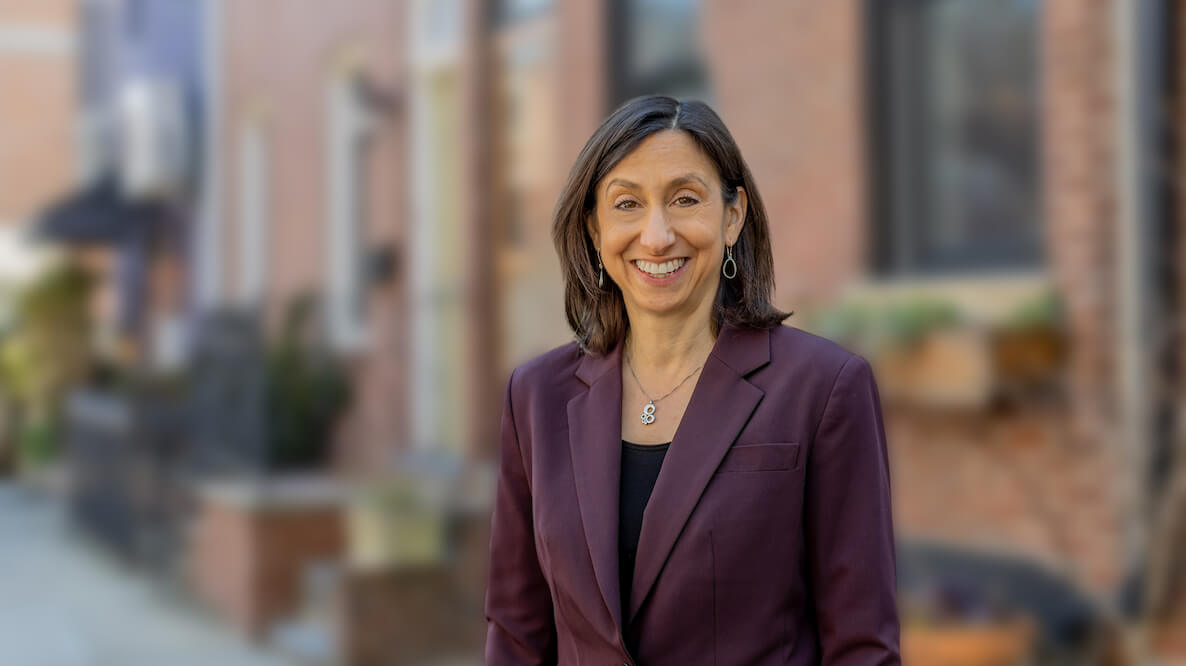Of all the newcomers running for seats on City Council this election — and there are many — Rue Landau is among the most experienced. The former head of both the City’s Commission on Human Relations and Fair Housing Commission has spent 12 years working under the two most recent mayoral administrations and 10 years as senior housing attorney at Community Legal Services. She also taught housing law at Temple, and directed law and policy at the Philadelphia Bar Association.
If elected, she says, “I can start on day one.”
Five members of the current City Council have officially endorsed her, including Curtis Jones, who worked with Landau on “ban the box” and other legislation. He refers to her as “my Rue.”
Former Councilmember and mayoral hopeful Maria Quiñones Sánchez sees similarities between herself and the candidate. “I look at Rue as a very, very pragmatic progressive,” she says, adding that, if elected, Landau will “hit the ground running.”
“My parents instilled in me that each one of us needs to help heal the world,” Landau told Al Día.
The problems Landau plans to tackle if elected — gun violence, neighborhood disinvestment, access to affordable housing — are all too familiar to Philadelphians (and not significantly different from her opponents’ priorities).
It’s how Landau plans to do it that is different: Don’t just pass laws; make sure they work. Make laws accessible, understood — and used — by the people who need them most. Then, keep improving them.
“They say good ideas go to bureaucracy to get killed. Too many times, we plan for the 1 percent who might take advantage of something, and overburden the 99 percent who need it. But Rue is like, How do we make this simple, accessible, practical?” says Quiñones Sánchez. “Rue’s gonna look at it as: How do we have impact; how are we transparent; how are we accountable to people? She’s a very thoughtful leader that way. Government has to work for people, right?”
Activist lawyer
Landau was born outside city limits in Cheltenham, Montgomery County, moments before her identical twin sister, Suzanne. Today, the sisters and their older brother Rich, chef-owner of Vedge Restaurant, live within a few blocks of each other in Bella Vista. They are, quite literally, close. When they were unable to be with their father, who had a rare neurological disorder, during Covid, the three siblings organized family visits at the floor-to-ceiling windows of their dad’s residence.
Upon graduating from the University of Delaware, Landau moved to 10th and Clinton streets, the edge of the Gayborhood. She’d recently come out, and wanted to be among her new, official “vibrant community,” she told the Jewish Exponent. (If elected, Landau would become the first out LGBTQ+ Councilmember; other LGBTQ+ candidates are also running for at-large seats.)
It also felt only natural to give back to that community. She told Al Día, “My parents instilled in me that each one of us needs to help heal the world.”
She began volunteering with ACT UP, the seminal HIV/AIDS activist organization, in 1991, and later the housing activist group the Kensington Welfare Rights Union. “During the AIDS epidemic, the government was not doing anything for those contracting the virus, not making services available, and doing nothing to help with prevention,” she further told Al Día, “We’re in a better place now — but not with housing. What we were fighting for then is the exact same today. The bureaucracy makes it extremely difficult to get access to it. Folks can’t afford to pay market rents.”
“Rue’s gonna look at it as: How do we have impact; how are we transparent; how are we accountable to people? She’s a very thoughtful leader that way.” — Maria Quiñones Sanchez.
Determined to make change through her profession, Landau enrolled in law school at Temple with the mission of getting “one of these highly coveted jobs like Community Legal Services (CLS).” After she graduated, she spent a decade at CLS, working to prevent evictions and secure stable housing for poor Philadelphians — at times handling, The Inquirer reported, “70 cases at a time.”
In 2002, Landau met Kerry Smith, the Bostonian who’d become her wife, through a mutual acquaintance in New York City. As the relationship grew serious, Smith realized she couldn’t get her girlfriend out of Philly, and would have to move here herself. Smith, also an attorney, also now works in the housing unit of CLS.
On May 20, 2014, the couple became the first in Pennsylvania to receive a same-sex marriage license. They now have a teenage son who plays baseball and attends a public magnet high school.
“I really like to fix things.”
When the new Council is seated in January, 2024, it will be the least experienced group in recent memory. By Election Day, only eight members of the 17-person legislative body will have completed one or more terms. This is where Landau’s experience will be needed, says Quiñones Sanchez.
Here are some of the idea Landau plans to enact if elected to Council:
Solve gun violence with collaboration and consistency
Landau looks to other cities that have reduced gun violence for solutions Philly is not implementing, or not well enough — cities like Oakland, California, Camden, New Jersey, and Boston, Massachusetts. And, she says, she will work to ensure Philadelphia is investing in violence intervention and prevention programs that are effective. “We need to track the programs, and we need to hold them accountable,” she says.
Some of that starts with collaboration, a skill she says she has honed in her years of activism and government service.
“We have to bring the stakeholders together, weekly, and keep them reporting on how things are working,” she says. “We have to tweak our programs to make them fit well for each neighborhood — and constantly work on the projects, because there’s so much at stake.”
The trouble with Philadelphia’s current approach: Landau believes it’s short-sighted, piecemeal, unreliable and not urgent. “It’s a lack of handling the situation like an emergency — and being consistent … We’ve been in a situation where we’ve had a lack of vision, a lack of goals. We need to turn things around immediately. We need all hands on deck, from elected officials to community leaders to communities in general.”
Normalize conflict resolution through schools
At the Commission on Human Relations, Landau saw the impact of retraining staff and supporting students’ emotional health to help stop violence before it starts, through schools. She plans to advocate for conflict resolution and de-escalation techniques to be taught to all students and adults in every school from kindergarten through 12th grade. “We need to normalize these techniques, to normalize how to handle conflict without immediately resorting to violence,” she says. “If we can teach kids throughout their lifetimes, when they become teenagers and have a problem, they are not grabbing a gun.”
Landau witnessed the effect of this kind of work at South Philadelphia High School. In 2010, after Asian students there reported suffering from extreme bullying, Landau held 11 public meetings in the catchment. From there, she oversaw the rewriting of the school’s bullying and harassment policies and established retraining for staff. “It wasn’t a report that sat on the shelf,” she says of her department’s work.
(It was also a lesson for Landau in another way. She says 11 meetings were overkill — and jokes this is yet another important experience she’ll bring to Council.)
She also points to Northeast High School, where a former principal celebrated the international diversity of its students, instituted peer counseling for resolving student-to-student problems, and started an ambassador program that included the varsity football captain welcoming new students by walking them through the building.
As the parent of a teenager, she sees what happens when students age out of extracurricular and City-sponsored youth programs. Not all teens play sports or join clubs. Landau wants to bring new programs specifically for older youth to rec centers: woodworking, for example, as a pathway into the carpentry trade and maybe a union job.
Communicate. To everyone.
“I hear it every single day, and have heard it from every community in the city: When it comes to City departments, from L & I to the Department of Labor — everyone wants them to function more efficiently, to enforce the laws,” Landau says. Part of the problem is a lack of staff, she says. That one needs to be resolved with better HR and time. The bigger picture problem: “very little communication” between Council and the administration, she says.
She’s experienced it firsthand — and solved her fair share of conflicts. The City commended her as the force behind the passage of Wage Equity Ordinance, which Landau defended and was ultimately upheld by a three-judge panel (Julio Fuentes, Theodore McKee, Jane Roth) on the U.S. Court of Appeals for the Third Circuit. When landlords and tenants were set to experience the impact of new or suddenly enforced housing laws, she spoke with groups directly to make sure everyone understood their rights.
“We have affordable housing issues; we have gentrification issues; we have discrimination issues that she’s going to be uniquely qualified to address,” says Councilmember Jones. “In addition, she’s an attorney that understands what our job description is as lawmakers. I think she’s gonna have a shorter learning curve to understand that aspect of it.”
All this talking, negotiating, face-to-face meeting is hard work, she says, but “I kind of love it. There’s a whole technocrat side of me: I am a problem solver. I really like to fix things, and I can’t wait to get started doing it … now.”
The Citizen is writing about Philadelphia City Council candidates who are doing what for a long time was the unthinkable: Bucking the system by running for office with ideas and experience — not just by dint of being the usual suspects. Because if there’s one thing we need more of, it’s this: More people paying more attention to our local politics, running for office, offering solutions and prepping to bring about much-needed change.
 Lead support for Every Voice, Every Vote is provided by the William Penn Foundation, with additional funding from The Lenfest Institute, Peter and Judy Leone, the John S. and James L. Knight Foundation, Harriet and Larry Weiss, and the Wyncote Foundation, among others.
Lead support for Every Voice, Every Vote is provided by the William Penn Foundation, with additional funding from The Lenfest Institute, Peter and Judy Leone, the John S. and James L. Knight Foundation, Harriet and Larry Weiss, and the Wyncote Foundation, among others.
Correction: A previous version of the article misstated that Landau spoke with the three-judge panel about the Wage Equity Law. She instead advocated for the law.
![]() MORE ON CITY COUNCIL ELECTIONS FROM THE CITIZEN
MORE ON CITY COUNCIL ELECTIONS FROM THE CITIZEN



